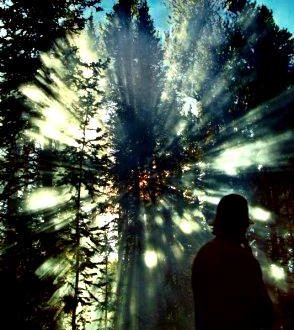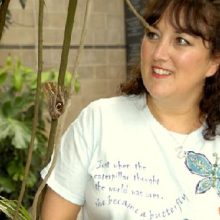Recently, I heard someone who claimed to have contact with the other side. He said that those in the afterlife usually found it difficult to visit this realm because it was like entering a thick fog of negative emotion and irrationality. Whether or not this is true, I do know that for me, this realm often feels like a thick fog obscures it. Some say we are adversely affected by the fog of electromagnetic noise emanating from cell phones, wi-fi, etc. Recently, there was a brief blackout where I live, and I felt a wonderful quieting that was more than a diminishing of acoustical noise.
I find the fog of psychic noise more oppressive, and for this reason, living in large cities is difficult for me, even though I grew up in the Bronx. I like to get up in the pre-dawn hours to write when there is less psychic noise of waking personalities in the surrounding community. There are places and times when the fog is lessened, and we need to make good use of such zones of clarity.
Much of the time, the thick and heavy fog of the Babylon Matrix, whatever its source, feels inescapable. This is one of the givens of human incarnation. To find our way through the fog, we need strategies to deal with it.
Using myself as example, the fog is often created by internal perturbations — fluctuations in my brain chemistry and the ever-changing weather systems of mood. What I eat has much to do with the thickness of the fog. If I eat heavy, highly processed food, dairy, etc. (which I rarely do), then I am going to feel foggier. If I eat smaller portions of high-quality food (as compared to food-like substances), I feel sharper. Similarly, vigorous exercise makes me much sharper.
I avoid living in places where the fog is thicker, and I use the times of the day when there is more clarity to do my highest-value work. There are two basic strategies implied here — going to places where the fog is not so thick and maintaining practices to make yourself sharper so that you can be alert even in a foggy realm.
Some of the thickest fogs are generated by the presence of unconscious people in our environment. This fog is often explicit and tangible. You may be a captive audience, riding in a vehicle, for example, with others who have nothing to say but are saying it as loudly and volubly as possible. This is a direct interference with your interior processing unless you are, unlike me, especially gifted at tuning it out. Fog emanates from the sound of a television in the background, from the info overload of the present era, with text messages, emails, phone calls, advertisements, and overheard chatter all streaming in at once. The average home has half a million objects in it these days, and many of those objects have computer chips in them and are subject to distracting and maddening glitches. Other times, the foggy interference is subtle, more of a vague, pervasive miasma.
I often find that the fog seems to creep up on me, and I’ll feel a lethargic, unfocused, fungal-like fuzziness encroaching, slowing me down, sapping the very resources I need to clear through it. As I’ve gotten older, I’ve become better at burning through such fogs by relentlessly focusing on my mission objectives. See: Stoking the Fire https://zaporacle.com/card/stoking-the-fire/. To find my way through such a fog, I ask myself, “What is the best use of my time right now?” If something of high value is available, something I will remember well on my deathbed, then I engage it — usually, this is a creative task, a quality human interaction, or an enriching cultural experience. In other cases, the best way to deal with the fog is to summon will and focus to work through some of the obscuring clutter of unfinished tasks and disorganized objects. Cleaning up my living space is a good use of such time — it doesn’t take much mental clarity, and a messy living or working space is a huge fog source. Sometimes, meditation, not doing, is the best choice as it can increase awareness of the fog of distracting thoughts and inner preoccupations. Intense cardio exercise will almost always cut through fog for me. Spending time in nature can also be an antidote to manmade fog as you immerse yourself in a noise and clutter-free zone.
This card was originally inspired by an email I received from Brandt, a young friend with a strong commitment to consciousness. He wrote, “I am back in Olympia, re-adjusting to this city after some travel, and I feel like the year away has given me the ability to sort of find a bit more of who I am or want to be, so the city with all of its influences on who I could or should be seems less daunting, and I feel much less anxious when I don’t line up with the images/currents around me.” In other words, by taking a year off from college, he has a stronger sense of who he is as he has progressed on the path of individuation, and therefore, the prevailing zeitgeist around him cannot dominate him, cannot fully fog his inner clarity, and sense of who he is.
Although Brandt is finding his way through the fog, there are many lost souls, those who immerse themselves in thickening fogs. Some intentionally fog out with bong hits or beer. Some people are so accustomed to living in fog that they’re as unaware of it as fish are of being wet. Fog has become their default state, and they’ve become comfortably or uncomfortably numb. Many are in medicated/self-medicated fogs or eclipsed by the fog of sub-clinical depression, which has become almost the norm in our society.
In the midst of thick fog, we may become apathetic and indulgent, slouching into our various addictions. When I was younger, I would sometimes stop in the midst of fog and blame myself for it, and look back regretfully. Looking back in a fog, one becomes paralyzed. Do not do life evaluation or evaluation of major relationships when in a fog, as your vision is limited! Instead, look at what is immediately before you and directly up ahead. We need to be aware that we are in a fog to be able to sharpen ourselves to deal with it. It is crucial that when we recognize we are in a fog, we do not thicken it by wasting energy on self-criticism.
To find your way through a fog, summon inner fire and work at anything that needs doing and is directly before you.
 ZapOracle.com home to the free 720-card Zap Oracle
ZapOracle.com home to the free 720-card Zap Oracle






